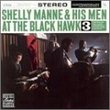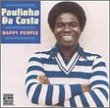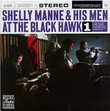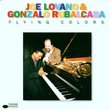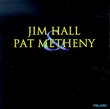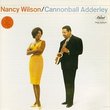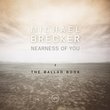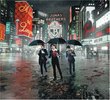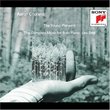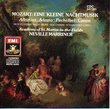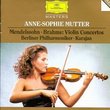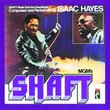| All Artists: Shelly Manne Title: Live at the Black Hawk 2 Members Wishing: 2 Total Copies: 0 Label: Ojc Release Date: 7/1/1991 Album Type: Live Genres: Jazz, Pop Styles: Cool Jazz, Bebop Number of Discs: 1 SwapaCD Credits: 1 UPCs: 025218665728, 0090204070800, 025218665742, 090204070800 |
Search - Shelly Manne :: Live at the Black Hawk 2
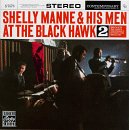 | Shelly Manne Live at the Black Hawk 2 Genres: Jazz, Pop
|
Larger Image |
CD DetailsSimilar CDs
Similarly Requested CDs
|
CD ReviewsDefinitive live jazz N. Dorward | Toronto, ON Canada | 11/08/2001 (5 out of 5 stars) "The multiple-volume _Live at the Blackhawk_ set is one of the classic live dates of the 1950s. West Coast jazz has been usually unfairly denigrated in the annals of jazz, as being too buttoned-down & superficial, in comparison with the increasingly aggressive & blunt hard bop of the East Coast of the time. A listen to any of the albums in this series will quickly dispose of such stereotypes. Manne usefully avoids the jauntiness & bounciness that sometimes beset West Coast jazz: these performances are relaxed but intensely bluesy at the core. This volume includes only three tunes, Benny Golson's classic "Step Lightly" (two takes are given, of which the 2nd, unreleased take is notably faster), a medium-up "What's New" which builds in excitement peerlessly over 13 minutes, & a strutting blues by Charlie Mariano, "Vamp's Blues" which took up an entire side of the original LP. ("A Gem from Tiffany" is merely the band's signoff at the end, just a 15 second coda to the disc.)The band is a fine one. Richie Kamuca has never got the attention he deserved, but he is a tenor player fully the equal of Harold Land, Teddy Edwards or JR Monterose, his West Coast peers. His elegant lines & foggy Lestorian tone recall his East Coast contemporary Hank Mobley. Joe Gordon was one of the finest trumpeters of his generation (& died tragically young), with a charmingly tart tone which frequently has the quality of speech. The British ex-pat Victor Feldman is a notably subtle pianist (who was briefly in Miles Davis's band in the 1960s just before Herbie Hancock, & the association of the two pianists isn't coincidence, as Miles was at the time looking for more colouristic approaches to harmony than were to be found in bop piano). Monty Budwig & Shelly Manne make a rhythm section at once subtle & yet irresistably swinging. Manne was, perhaps rarely for a drummer of his generation, very much attuned to colour & pure sound rather than just dropping bombs. He's always worth listening to, whatever anyone else in the band is doing.Classic jazz--recorded in 1959, it sums up the decade of jazz just before the wrenching innovations of the 1960s. Manne, of course, was already aware of the coming revolution, having played on one of Ornette Coleman's earliest recording dates...." This is Jazz N. Dorward | 01/06/2001 (5 out of 5 stars) "I usually only write reviews for [new] selections yet these five CDs are exceptions. For me, this is the sound of jazz. This is the sound of a smoky club filled with the buzz of conversation and the soaring song of five cats wailing. This is jazz. This is the sound that comes when five people become one ensemble and no one individual dominates because there are no individuals. This is the quintessential jazz quintet: trumpet, tenor sax, piano, bass, and drums. There's a vibe here that's unbeatable whether it's uptempo, downtempo, a standard, rhythm changes, or the blues. Am I saying that this group is better than the Hot Fives and Sevens, the Charlie Parker Sextet, the Miles Davis Quintet, Coltrane's Quartet, the Jazz Messengers, or any of those now legendary groups? Of course not. But I am saying that this is "the" recording. This is the one in which it was all captured perfectly: jazz was still in full swing and definitely still hip; bebop had cooled and formed a rock-solid crystal; and the recording process had reached that wonderful stage of finally ironing out all the pops and cracks. The sound is relaxed: these guys aren't experimenting; they're just in the groove. But what a groove that is. These five albums do what jazz does best: communicate. And you're right there with them, listening to what they've got say. And, does it sound good." The Epitome Of West Coast Jazz Michael B. Richman | Portland, Maine USA | 07/23/2000 (5 out of 5 stars) "I first got into jazz in high school when I decided to listen to some of my step-father's old records. His tastes are somewhat commercial and there were plenty of jazz albums from the 70s with strings and electric bass. But there was also the four volumes of Shelly Manne's "At The Blackhawk." I now own over 1000 jazz CDs, and these "commercial" jazz albums are still among the best I own. Perfection is the word that best describes Volume 2. Three classic standards, and a brief catchy concluding "theme," performed impeccably by a band that are household names only in their own households. But these cats just know how to swing -- Joe Gordon's crisp trumpet lines, Richie Kamuca's soulful tenor sax, Victor Feldman's bright piano, Monty Budwig's rich bass, and the old master propeller himself, Shelly Manne. The whipped cream and cherry to top this sundae of an album off is the crystal clear live sound. Even the Blackhawk's phone ringing in the background sounds perfect. By the way, that's me on the telephone, calling back in time to the club, begging to get a table for the next show!"
|

 Track Listings (5) - Disc #1
Track Listings (5) - Disc #1